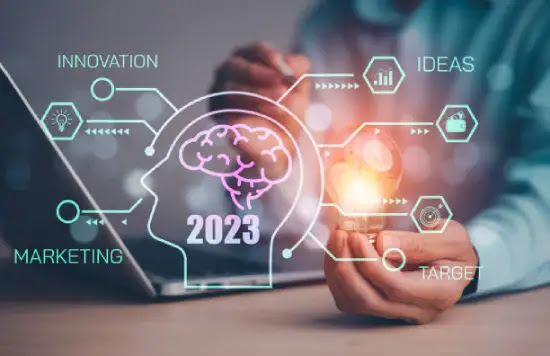Predicting the best technologies to learn in 2023 involves
considering industry trends, emerging innovations, and the evolving needs of
the job market. As of my last knowledge update in January 2022, I can provide
insights into several technologies that were gaining prominence and are likely
to continue being relevant in 2023. However, it's important to note that the
technology landscape is dynamic, and new trends may have emerged since then.
- Artificial
Intelligence (AI) and Machine Learning (ML): AI and ML continue to be
at the forefront of technological advancements. Learning AI and ML
techniques can open doors to various opportunities in fields like data
science, predictive analytics, natural language processing, and computer
vision. As businesses increasingly leverage AI for automation and
decision-making, professionals with AI and ML skills are in high demand.
- Cloud
Computing: Cloud computing remains a foundational technology, and the
demand for cloud-related skills is expected to persist. Cloud platforms
like Amazon Web Services (AWS), Microsoft Azure, and Google Cloud provide
a scalable and cost-effective infrastructure for deploying applications.
Learning about cloud services, serverless computing, and containerization
can enhance your marketability.
- Edge
Computing: With the rise of IoT devices and the need for real-time
data processing, edge computing has gained importance. Edge technologies
enable computation and analysis closer to the data source, reducing
latency and improving efficiency. Understanding edge computing concepts
and platforms can be valuable, especially as the deployment of IoT devices
continues to grow.
- DevOps
and Continuous Integration/Continuous Deployment (CI/CD): DevOps
practices and CI/CD pipelines are crucial for organizations aiming to
streamline and automate software development processes. Proficiency in
tools like Jenkins, Git, Docker, and Kubernetes, along with knowledge of
DevOps principles, can enhance your ability to contribute to efficient and
collaborative development workflows.
- Cybersecurity:
As cyber threats become more sophisticated, cybersecurity remains a top
priority for organizations. Learning about cybersecurity best practices,
threat detection and prevention, secure coding, and ethical hacking can
make you an asset in safeguarding digital assets. Certifications like
Certified Information Systems Security Professional (CISSP) and Certified
Ethical Hacker (CEH) can be valuable additions.
- Blockchain
and Cryptocurrency Technologies: Blockchain technology, known for its
role in cryptocurrencies, is finding applications beyond finance. Learning
about blockchain development, smart contracts, and decentralized
applications (DApps) can open opportunities in industries like supply
chain management, healthcare, and decentralized finance (DeFi).
- Quantum
Computing: While still in its early stages, quantum computing is an
area of research and exploration. Quantum computers have the potential to
solve complex problems exponentially faster than classical computers.
Familiarity with quantum computing principles and algorithms may become
increasingly relevant as this technology matures.
- Natural
Language Processing (NLP) and Conversational AI: NLP technologies and
conversational AI systems are becoming more sophisticated, driving
innovations in virtual assistants, chatbots, and language translation
services. Understanding NLP concepts, machine translation, and dialogue
systems can be valuable for developing intelligent and user-friendly
applications.
- 5G
Technology: The rollout of 5G networks is transforming connectivity
and enabling faster data transfer speeds with lower latency. 5G technology
is crucial for applications such as augmented reality, virtual reality,
and IoT. Learning about 5G infrastructure, protocols, and application
development in a 5G environment can be valuable in the evolving
telecommunications landscape.
- Extended
Reality (AR/VR/MR): Augmented Reality (AR), Virtual Reality (VR), and
Mixed Reality (MR) technologies are expanding beyond gaming and
entertainment. These technologies find applications in training,
education, healthcare, and various industries. Familiarity with AR/VR
development tools, 3D modeling, and user experience design in extended
reality environments can be a sought-after skill set.
- Robotic
Process Automation (RPA): RPA involves automating routine, rule-based
tasks using software robots. Proficiency in RPA tools and frameworks can
be valuable for organizations seeking to enhance operational efficiency.
Learning about process automation, workflow design, and integrating RPA
with AI technologies can broaden your skill set.
- Cross-Platform
Mobile Development: With the prevalence of mobile devices,
cross-platform development frameworks like React Native, Flutter, and
Xamarin have gained popularity. These frameworks allow developers to write
code once and deploy it on multiple platforms. Learning cross-platform
development can save time and resources in mobile application development.
- Human
Augmentation Technologies: Human augmentation involves using
technology to enhance physical and cognitive abilities. Wearable devices,
biohacking technologies, and assistive technologies are examples of human
augmentation. Understanding the integration of technology with the human
body can be relevant in healthcare, accessibility, and emerging
human computer interaction fields.
- Sustainable
Technologies: Environmental sustainability is becoming a crucial
consideration in technology. Learning about green IT practices,
energy-efficient computing, and sustainable software development can align
your skills with the growing demand for eco-friendly solutions.
- Biometric
Authentication: Biometric authentication methods, including facial
recognition, fingerprint scanning, and iris recognition, are increasingly
used for secure user authentication. Understanding biometric technologies
and their applications in security systems, mobile devices, and access
control can be valuable in the evolving landscape of identity
verification.
In conclusion, the best technologies to learn in 2023 will
depend on individual interests, career goals, and industry trends. Staying
adaptable and continually updating your skill set based on emerging
technologies is essential in the fast-paced world of IT. Additionally, pursuing
relevant certifications and gaining hands-on experience through projects and
collaborations can further enhance your marketability in the evolving
technology landscape.



Comments
Post a Comment